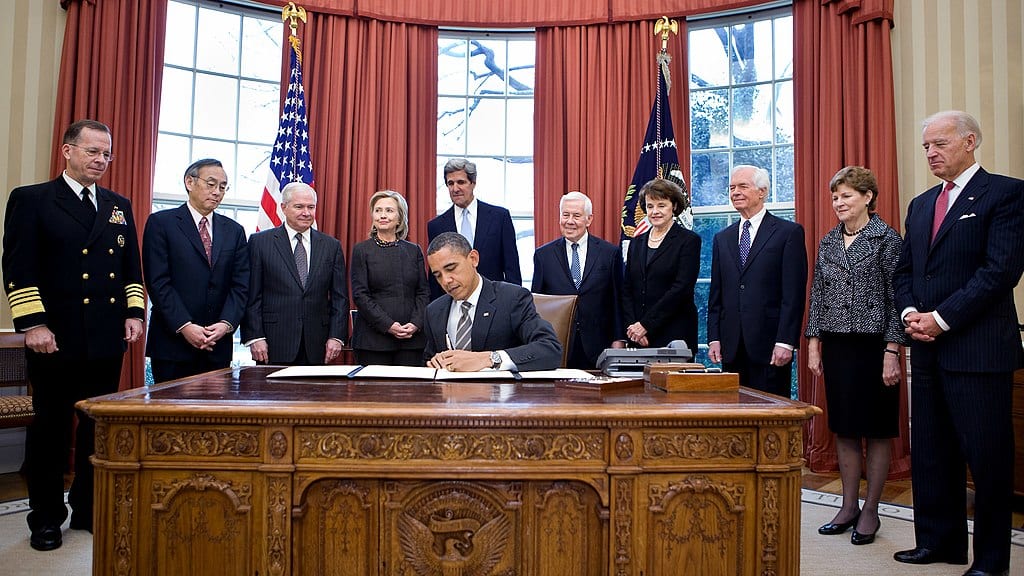 Chuck Kennedy (official White House photograph)
Chuck Kennedy (official White House photograph)
Post-INF: U.S. In No Hurry to Extend New START
The U.S. has recently wavered in its commitment to nuclear treaty-based security. In early February of this year, it suspended the Intermediate-range Nuclear Forces Treaty (INF), citing Russian violations as its reasoning. The only other existing nuclear treaty between the U.S. and Russia, New START, is set to expire in 2021; the U.S. doesn’t seem anxious to save that one, either.
The 2011 New START treaty, signed by Barack Obama and Dmitry Medvedev, limits both the United States’ and Russia’s nuclear arsenals to 1,550 deployed strategic nuclear warheads, 700 deployed ICBMs, SLBMs, and heavy bombers, and 800 deployed and non-deployed ICBM launchers, SLBM launchers, and heavy bombers. The treaty also provides measures for transparency and verification.
Said transparency and verification are arguably the most important aspects of the treaty. Measures to achieve these include “on-site inspections and exhibitions, data exchanges and notifications related to strategic offensive arms and facilities covered by the Treaty, and provisions to facilitate the use of national technical means for treaty monitoring.” Essentially, the United States and Russia have agreed not only to a cap on certain nuclear weapons, but to a bilateral system wherein they can be held directly accountable to each other through mutual transparency.
The “18 on-site inspections of Russian weapons year” that this treaty affords the United States provide valuable information for the U.S.—we are able to monitor exactly what weapons the Russians have, how many they have, and whether those numbers are changing over time. Transparency reduces the number of “surprises” both nations experience, which is helpful for national security; knowing your potential enemy’s arsenal allows you to avoid having to increase yours out of fear.
With a method in place for verification and transparency, both the U.S. and Russia avoid the prospect of an arms race, allowing them to spend that money on other defense materials. For the United States, this means more money for defense systems and maintenance our forces actually need. However, a falling out of New START means there are no holds barred, and there’s no telling what kind of nuclear arsenals might be developed. No one would be able to check.
In December of 2010, Adm. Michael Mullen wrote to the Senate, which was in the midst of debating whether to approve the treaty. Admiral Mullen, who was Chairman of the Joint Chiefs of Staff at the time, said, “Ratification of the New Start treaty is vital to U.S. national security…Through the trust it engenders, the cuts it requires, and the flexibility it preserves, this treaty enhances our ability to do that which we in the military have been charged to do: protect and defend the citizens of the United States.”
Despite the strategic advantages New START offers, the U.S. is signaling that it is in no hurry to renegotiate the treaty.
Russia is aware of the United States’ lack of urgency to rejuvenate New START. Last Thursday, Russian Deputy Foreign Minister Sergei Ryabkov noted that the U.S. “has shown ‘no readiness or desire’ to engage in substantive talks on extending the pact,” according to VOA News. According to President Trump’s national security advisor, John Bolton, the administration “does not have a position that we’re prepared to negotiate.” Although Russian officials, like Ryabkov, seem anxious to renegotiate, Bolton has simply stated that “we have plenty of time.”
Jim Miller, former undersecretary of defense for policy under Obama, said at an Atlantic Council event in 2018 that “if the Russians don’t see us as reliable partners in arms control agreements and think they are likely to be surprised by us… they may begin to hedge and they may be more inclined, rather than less inclined, to prepare themselves for a [nuclear] breakout.”
ASP praised New START when it was first ratified in 2010, calling the treaty “a triumph of reasoned and principled discourse.” The level of nuclear deterrence and international transparency it provides gifts the United States the opportunity to maintain a level discourse with Russia when it comes to nuclear weapons. It is in the best interests of the U.S. to begin signaling a willingness to renegotiate, or at the bare minimum extend, the New START treaty.
With INF scrapped and New START hanging on, the strategic risk is high. Not only has the dual suspension of the INF confirmed a willingness to expand land-based nuclear arsenals, but the lack of discussion on a renewed New START threatens a falling out of bilateral accountability and transparency between the U.S. and Russia.






